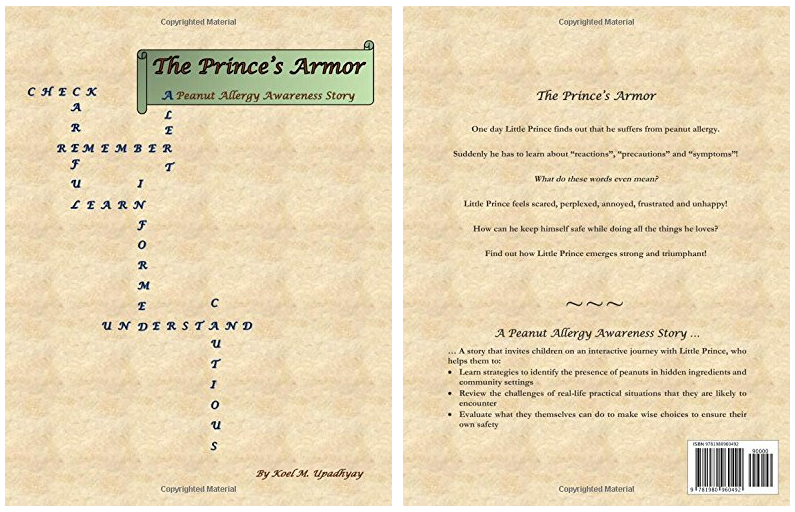From our friends at Mylan Specialty:
Incidence of Anaphylaxis During Winter Events Highlights Importance of Adding a Preparedness Checklist to Holiday Planning
Mylan Specialty Offers Tips for Parents of Children with Life-Threatening Allergies to Help Prepare for Seasonal Celebrations
BASKING RIDGE, N.J., Dec. 18, 2012 /PRNewswire/ — Findings from an online survey released today by Mylan Specialty L.P., the fully-integrated specialty pharmaceutical business of Mylan Inc. (Nasdaq: MYL), reveal that, of those surveyed, more than half (55%) of children with life-threatening allergies have experienced anaphylaxis (a life-threatening allergic reaction) during a winter holiday event, a statistic that rises to 70% among families in urban areas. This holiday season, parents can give their children and those around them a gift they can put to good use a lesson in preparedness to help avoid allergic triggers.
The survey, conducted by Harris Interactive and commissioned by Mylan Specialty, included more than 300 U.S. parents of children with life-threatening allergies and found that nearly 90% of their children have holiday events planned with friends and family or at school. When asked about habits surrounding how they help prevent or prepare for anaphylaxis during these activities, nearly all parents are taking some type of proactive measure. However, in their self-reporting, less than 60% of parents take some of the commonly recommended measures: talking to their children about avoiding allergens by reviewing food labels (57%); ensuring those they are celebrating with are aware of their allergies (53%) and having access to epinephrine auto-injectors at all times (56%).
Anaphylaxis is a life-threatening allergic reaction that is rapid in onset and may cause death either through swelling that shuts off airways or through a significant drop in blood pressure. Avoidance of allergic triggers is the critical first step to help prevent anaphylaxis; however, accidental exposure may still happen. To help parents be better prepared during the holidays, and throughout the year, parents are urged to have an anaphylaxis action plan and review it with their child. An anaphylaxis action plan includes avoiding known allergens, recognizing symptoms, having access to two epinephrine auto-injectors and seeking immediate emergency medical care.
“While the incidence of anaphylaxis during holiday events is disturbing, perhaps more alarming is the low incidence of preparedness. The fact is that for people at risk for anaphylaxis it can happen anywhere and at any time,” said Todd A. Mahr , M.D., chair of the Section of Allergy and Immunology of the American Academy of Pediatrics. “As a physician and a parent of a child with life-threatening allergies, I am encouraging others to revisit their anaphylaxis action plan and to ensure access to appropriate treatment in the event anaphylaxis occurs not being prepared is just not an option.”
According to food allergy guidelines released in December 2010 by the National Institute of Allergy and Infectious Diseases (NIAID), a division of the National Institutes of Health (NIH), epinephrine is the only first-line treatment in all cases of anaphylaxis (including from food allergies) and should be available at all times, in the form of two doses, to people at risk for anaphylaxis. According to the guidelines, if experiencing anaphylaxis, a person should use an epinephrine auto-injector and seek immediate emergency medical attention.
EpiPen® (epinephrine) Auto-Injector has been the number one prescribed epinephrine auto-injector for more than 20 years and constitutes more than 99% of the epinephrine auto-injector market. Carrying an epinephrine auto-injector does not prevent patients from having an anaphylactic reaction; hence, patients must avoid their allergens at all times.
“Food is very much a part of our nation’s holiday celebrations, and that means families managing potentially life-threatening allergies need to be extra vigilant at this time of year,” said Heather Bresch , CEO of Mylan. “To support parents we are encouraging them to have a checklist to help avoid allergens and to be prepared if anaphylaxis occurs.”
FARE formerly the Food Allergy & Anaphylaxis Network has compiled the following tips that could help alleviate some of the worries that go along with the holiday season:
RSVP ASAP! Be a great guest by contacting your host as soon as your invitation arrives. Start by communicating gently and by educating others; remember, your host is hoping to plan the “perfect” holiday party or meal.
The rules. Go over “the rules” for parties with your kids in advance so that the most important safety rules, such as not eating a food unless he or she knows the ingredients, will be fresh in their minds when they arrive.
Make it and they will eat. Offer to bring safe food so that you know there will be something there that your child can eat and your host doesn’t have to worry about separate food preparations. Share dishes that would be allergen-free.
Ship ahead. If you’re flying to visit friends or family, you may want to make some simple allergy-free foods that travel well and ship them to your host ahead of time.
Start the trend. Include an ingredient listing card with your food contribution to the party. Also, add an ingredient card to all food gifts you send out from your kitchen. This is a great opportunity to raise awareness at a party and with friends.
Tag-team parenting. If your whole family is invited to a party, plan ahead with your spouse to divide the task of supervising your young child. With designated “on duty” times, your child will be supervised, and each parent will have time to socialize. This keeps little hands away from allergens that may be out (such as a bowl of chocolates or nuts).
Carry medications. Per the NIAID food allergy guidelines, always have immediate access to two doses of epinephrine just in case unrecognized food allergens are hiding in holiday treats.
For more information about managing food allergies, visit www.foodallergy.org.
About Anaphylaxis
Anaphylaxis is a life-threatening allergic reaction that has many possible triggers, occurs quickly, without warning, and must be treated immediately with epinephrine. Symptoms may include hives or redness of the skin, tightness in the throat, nausea, dizziness, breathing problems, a decrease in blood pressure and/or fainting. Anaphylaxis can be caused by triggers such as food, stinging and biting insects, medicines, latex or even exercise. Epinephrine is the only first-line treatment for anaphylaxis. According to the food allergy guidelines developed by the National Institute of Allergy and Infectious Diseases, if experiencing anaphylaxis, a person should use an epinephrine auto-injector and seek immediate emergency medical attention. Epinephrine is a naturally-occurring hormone, also known as adrenaline, and it should be available at all times to patients at risk. Delays in epinephrine administration have been associated with negative health consequences, even possibly death.
Survey Methodology
The survey was conducted online, from August 24 to September 3, 2012 in the United States by Harris Interactive, on behalf of Mylan Specialty. Final results are among 302 U.S. adults, age 18+, who self-identified as caregivers of at least one child with a life-threatening allergy to food and/or latex. Data were weighted to be representative of U.S. adults who have children in their household, according to U.S. Census Bureau statistics. This included weighting by age, gender, income, region, educational status and propensity to be online.
All sample surveys and polls, whether or not they use probability sampling, are subject to multiple sources of error which are most often not possible to quantify or estimate, including sampling error, coverage error, error associated with nonresponse, error associated with question wording and response options, and post-survey weighting and adjustments.
About EpiPen® Auto-Injector
EpiPen® and EpiPen Jr® (epinephrine) Auto-Injectors are used for the emergency treatment of life-threatening allergic reactions. Each EpiPen 2-Pak® and EpiPen Jr 2-Pak® contains two single auto-injectors, instructions for use and a training device, with no drug product or needle, to help patients become familiar with the administration technique. EpiPen Auto-Injector should be administered immediately at the first sign of an anaphylactic reaction. EpiPen Auto-Injector is not a substitute for emergency medical treatment. Patients should seek emergency medical attention immediately following administration. For more information about EpiPen Auto-Injector, please visit www.epipen.com.
Indications
EpiPen® (epinephrine) 0.3 mg and EpiPen Jr® (epinephrine) 0.15 mg Auto-Injectors are for the emergency treatment of life-threatening allergic reactions (anaphylaxis) caused by allergens, exercise, or unknown triggers; and for people who are at increased risk for these reactions.EpiPen and EpiPen Jr are intended for immediate self administration as emergency supportive therapy only. Seek immediate emergency medical treatment after use.
Important Safety Information
EpiPen Auto-Injectors contain a single dose of epinephrine, which you inject into your outer thigh. DO NOT INJECT INTO YOUR VEIN, BUTTOCK, FINGERS, TOES, HANDS OR FEET. In case of accidental injection, please seek immediate medical treatment. Epinephrine should be used with caution if you have heart disease or are taking certain medicines that can cause heart-related (cardiac) symptoms.
Tell your doctor if you have certain medical conditions such as asthma, depression, thyroid disease, Parkinson’s disease, diabetes, high blood pressure and heart disease, have any other medical conditions, are pregnant or plan to become pregnant, or are breastfeeding or plan to breastfeed. Be sure to also tell your doctor all the medicines you take, especially medicines for asthma. If you have certain medical conditions, or take certain medicines, your condition may get worse or you may have longer lasting side effects when you take the EpiPen or EpiPen Jr Auto Injector.
The most common side effects may include increase in heart rate, stronger or irregular heartbeat, sweating, nausea and vomiting, difficulty breathing, paleness, dizziness, weakness or shakiness, headache, apprehension, nervousness or anxiety. These side effects usually go away quickly, especially if you rest.
Talk to your healthcare professional to see if EpiPen or EpiPen Jr Auto-Injector is right for you.
Please visit www.EpiPen.com to view the EpiPen Auto-Injector prescribing information.
Please visit www.EpiPen.com for the EpiPen Auto-Injector patient insert.
You are encouraged to report negative side effects of prescription drugs to the FDA.
Visit www.fda.gov/medwatch or call 1-800-FDA-1088.
About Mylan Specialty
Mylan Specialty, a subsidiary of Mylan Inc. (Nasdaq: MYL), is a specialty pharmaceutical company focused on the development, manufacturing and marketing of prescription drug products for the treatment of respiratory diseases, life-threatening allergic reactions and psychiatric disorders. For more information, please visit www.mylanspecialty.com.
About Mylan
Mylan is a global pharmaceutical company committed to setting new standards in health care. Working together around the world to provide seven billion people access to high quality medicine, we innovate to satisfy unmet needs; make reliability and service a habit, do what’s right, not what’s easy and impact the future through passionate global leadership. We offer a growing portfolio of more than 1,100 generic pharmaceuticals and several brand medications. In addition, we offer a wide range of antiretroviral therapies, upon which approximately one-third of HIV/AIDS patients in developing countries depend. We also operate one of the largest active pharmaceutical ingredient manufacturers and currently market products in approximately 150 countries and territories. Our workforce of more than 18,000 people is dedicated to improving the customer experience and increasing pharmaceutical access to consumers around the world. But don’t take our word for it. See for yourself. See inside. Mylan.com.
EpiPen®, EpiPen Jr®, EpiPen 2-Pak®, and EpiPen Jr 2-Pak® are registered trademarks of Mylan Inc. licensed exclusively to its wholly-owned subsidiary, Mylan Specialty L.P.
© 2012 Mylan Specialty L.P. All rights reserved.






COMMENTS